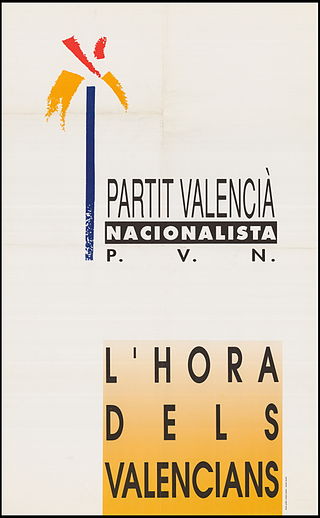
The Catalan Countries are those territories where the Catalan language is spoken. They include the Spanish regions of Catalonia, the Balearic Islands, Valencian Community, and parts of Aragon and Murcia (Carche), as well as the Principality of Andorra, the department of Pyrénées-Orientales in France, and the city of Alghero in Sardinia (Italy). It is often used as a sociolinguistic term to describe the cultural-linguistic area where Catalan is spoken. In the context of Catalan nationalism, the term is sometimes used in a more restricted way to refer to just Catalonia, Valencia and the Balearic Islands. The Catalan Countries do not correspond to any present or past political or administrative unit, though most of the area belonged to the Crown of Aragon in the Middle Ages. Parts of Valencia (Spanish) and Catalonia (Occitan) are not Catalan-speaking.

Nosaltres, els valencians, is a historical and political essay by the Valencian (Spain) author Joan Fuster, first published in 1962.

Valencian Union was a regionalist political party in the Valencian Community, Spain.

The Estelada is a flag flown by Catalan independence supporters to express their support for an independent Catalonia or independent Països Catalans. The design of the Estelada comprises the red-and-yellow bars of the Senyera, with the addition of a five-pointed star in a triangle at the hoist.

Both the perceived nationhood of Spain, and the perceived distinctions between different parts of its territory derive from historical, geographical, linguistic, economic, political, ethnic and social factors.
The names of the Valencian Community are diverse, even though Comunitat Valenciana is the only denomination with official status in its Statute of Autonomy. Nonetheless, this legal document includes in its Preamble other legal denominations that portray the history and nature of the territory: Regne de València and País Valencià.
Blaverism is a Valencian regionalist ideology in the Valencian Community (Spain) that emerged with the Spanish transition to democracy characterised by strong anti-Catalanism, born out of its opposition to Joan Fuster's book Nosaltres, els valencians (1962), which promoted the concept of the Catalan Countries which includes Valencia. They consider Fuster's ideas as an imperialist Catalan nationalist movement that tries to impose Catalan domination upon Valencia. Blaverism takes its name from the blue fringe which distinguishes the Valencian flag from other flags with a common origin, particularly from the Catalan.
Valencian nationalism or Valencianism is a political movement in the Valencian Community, Spain.
Valencianism is a political ideology of nationalist or regionalist character whose objective is the defense of the Valencian Community and its culture by the means of the establishment and strengthening of its own institutions.

Coalició Compromís, also known as Compromís, is a Valencianist electoral coalition in the Valencian Community, Spain. The parties involved include Més-Compromís, the left-wing Valencian People's Initiative, and the ecologist group Greens Equo of the Valencian Country and independent members. Together, they defend Valencianist, progressive and ecological politics.

The Grup d'Acció Valencianista (GAV) is a pro-Valencian blaverist organization which was created in 1977. They define themselves as "the fighting and warlike faction of real valencianism". Nonetheless, they are generally considered as an extreme right group due to their activities.

The Valencian People's Union was a political alliance created in 1982 when the Left Grouping of the Valencian Country (AEPV) and the Nationalist Party of the Valencian Country (PNPV) merged to contest the 1982 general election. In 1983, the United Left of the Valencian Country joined the coalition to contest the 1983 regional election. In 1984, AEPV and PNPV became a unified party.

The Battle of Valencia was an identity conflict held in the Valencian society during the Spanish transition to democracy. It involved the progressive valencianism known as Fusterianism and the conservative anticatalanist regionalism known as blaverism.

The Nationalist Valencian Party was a political party created in 1990 as an offshoot of the Valencian People's Union.
Levante-El Mercantil Valenciano is a Spanish regional newspaper from the Valencian Community that belongs to the Prensa Ibérica media holding. It had a brief precedent in Avance and it was the bulletin of the Valencian section of the FET y de las JONS. The newspaper later belonged to the Movimiento press. From 1977 it belonged to the Medios de Comunicación Social del Estado and in 1984 it was purchased by the private enterprise Prensa Valenciana.
Valencian Regional Union was a Valencianist and anti-Catalanist political party founded in the Valencian Community in 1977.

Valencian Nationalist Left is a left-wing valencian nationalist political party founded in the Valencian Community in 1979, as a refoundation of the previous Valencian Regional Union.

Valencian Democrats is a centrist, Valencianist political party founded in the Valencian Community in 2013 and reactivated in 2017. In 2018, the party achieved some agreements with some local independent parties and in total reached 17 city councilmen.

Valencian Coalition was a far-right blaverist political organization active in the Valencian Community between 2004 and 2011. CV was linked to more extreme factions of anti-Catalan valencianism, like the Grup d'Acció Valencianista (GAV).

Més, also known as Més–Compromís, is a Valencian nationalist party in the Valencian Community, Spain. It is the largest party in the Coalició Compromís since 2021, being created as a refoundation of the former Bloc Nacionalista Valencià.















